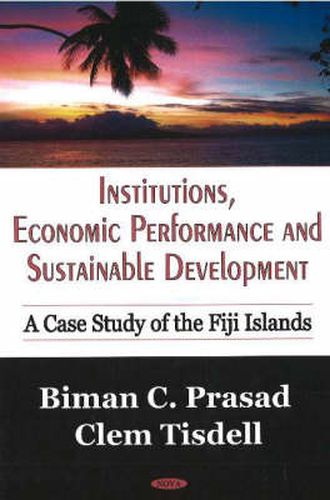Readings Newsletter
Become a Readings Member to make your shopping experience even easier.
Sign in or sign up for free!
You’re not far away from qualifying for FREE standard shipping within Australia
You’ve qualified for FREE standard shipping within Australia
The cart is loading…






Fiji has distinct institutional features that make it an ideal case for examining and discussing the consequences of institutional arrangements (particularly the nature of property rights) for national economic performance, development prospects, and the state of the environment which in turn, reflects a nation’s ability to achieve sustainable development. Furthermore, the nature of institutional arrangements in Fiji can be used to illustrate aspects of both the new and the old’ institutional economics. Apart from the fact that Fiji provides considerable scope for the exploration of institutional economics and its applications, Fiji is a comparatively important island nation in the south-west Pacific, that is, an important member of the Pacific Island Forum grouping of 14 island nations. The recent development of Fiji has been much influenced by its social history, particularly by its institutional structures established or codified during British colonial rule. Its present racial composition is largely a product of British colonisation. The significant Indian population of Fiji consists mostly of the descendants of Indians brought to Fiji by the British to produce sugar cane as a contribution to the economic development of the former British Empire. In many respects, the type of global imperialism that was well established during the nineteenth century was a forerunner to modern economic globalisation which involves a mixture of free trading blocs and multilateralism. The current population mixture of Fiji consisting of about equal numbers of Indian Fijians and Indigenous Fijians has its roots in Fiji’s colonial history. Furthermore, the codified systems of property rights (which largely excludes Indian Fijians from the ownership of land) was established by the British. It has been a major source of ethnic tension, and of social and political conflict in Fiji. We show that this system of property rights has had important negative consequences for economic growth in Fiji, for the economic performance of its industries, and for the conservation of its natural resources. It is also associated with a system of distribution of rents from land and natural resources which may not be equitable, and which also does not appear to be efficient administratively. This adds to social and political tension in Fiji.
$9.00 standard shipping within Australia
FREE standard shipping within Australia for orders over $100.00
Express & International shipping calculated at checkout
Fiji has distinct institutional features that make it an ideal case for examining and discussing the consequences of institutional arrangements (particularly the nature of property rights) for national economic performance, development prospects, and the state of the environment which in turn, reflects a nation’s ability to achieve sustainable development. Furthermore, the nature of institutional arrangements in Fiji can be used to illustrate aspects of both the new and the old’ institutional economics. Apart from the fact that Fiji provides considerable scope for the exploration of institutional economics and its applications, Fiji is a comparatively important island nation in the south-west Pacific, that is, an important member of the Pacific Island Forum grouping of 14 island nations. The recent development of Fiji has been much influenced by its social history, particularly by its institutional structures established or codified during British colonial rule. Its present racial composition is largely a product of British colonisation. The significant Indian population of Fiji consists mostly of the descendants of Indians brought to Fiji by the British to produce sugar cane as a contribution to the economic development of the former British Empire. In many respects, the type of global imperialism that was well established during the nineteenth century was a forerunner to modern economic globalisation which involves a mixture of free trading blocs and multilateralism. The current population mixture of Fiji consisting of about equal numbers of Indian Fijians and Indigenous Fijians has its roots in Fiji’s colonial history. Furthermore, the codified systems of property rights (which largely excludes Indian Fijians from the ownership of land) was established by the British. It has been a major source of ethnic tension, and of social and political conflict in Fiji. We show that this system of property rights has had important negative consequences for economic growth in Fiji, for the economic performance of its industries, and for the conservation of its natural resources. It is also associated with a system of distribution of rents from land and natural resources which may not be equitable, and which also does not appear to be efficient administratively. This adds to social and political tension in Fiji.